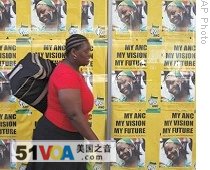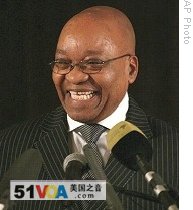Johannesburg
17 April 2009
 |
| A woman passes posters at ruling African National Party's headquarters in Johannesburg, 17 April 2009, ahead of country's election |
Jacob Zuma is in the last week of exuberant campaigning for his party.
"[The] ANC is different from other parties. That's why you should vote for it," he said. "If you vote ANC you are voting for the future of this country. It's the hope of the people. It's the future of the people.
If, as expected, the ANC wins the election with a clear majority, Zuma will almost certainly be elected the next president of South Africa by the newly constituted parliament. This will occur shortly before May 9 when his inauguration is planned.
 |
| African National Congress President Jacob Zuma, 07 Apr 2009 |
Many people wonder too, why so many mainly black South Africans still plan to vote for the ANC while expressing frustration, disappointment and even anger at high rates of joblessness and widespread poverty fifteen years after the advent of democracy.
Aubrey Matshiqi of University of Witwatersrand's Center for Policy Studies, tells VOA that in part the ANC is still reaping the dividend of liberation. More than that he says, despite its weaknesses, the ANC's developmental achievements as a government are unprecedented anywhere in the world over the same number of years.
"Many South Africans have access to government services they only dreamt of prior to 1994. And they will continue thanking the ANC for this," he said.
Even though the government has not met many of its own targets since 1994, it has built over 2.6 million houses and provided subsidies for another three million. It admits it is lagging behind on its promise to ensure that one third of agricultural land is owned by blacks by 2014; but, has settled 75,000 of nearly 80,000 claims for land restitution.
And veteran ANC member Frene Ginwala tells VOA that access to very basic services has made an enormous difference for millions.
"But have you any understanding what it means to somebody who has never had running water in the street, much less in the house," Ginwala said. "And yet seven million South Africans now have access to clean water without having to carry it up from somewhere."
South Africans live under a burden of a very high crime rate, with some 50 reported murders each day and equally high numbers of other violent crimes such as rape and assault.
There are daily reports of corruption at all levels of government, and perceptions of a government beset by corruption were not helped by a seven year corruption investigation against the country's likely next president Jacob Zuma.
Terror Lekota is the president of the four-month-old Congress of the People [COPE] formed when he and a group of other senior ANC officials split from the party after Zuma ousted former President Thabo Mbeki.
Lekota was the country's Minister of Defense until last October and tells VOA that the ANC in government developed a high level of tolerance for corruption because at the start of its tenure it failed to act against corrupt individuals, arguing that these were the teething problems of a new democracy.
"Instead of us arresting those, we displayed a level of tolerance of this kind of behavior which, later on, especially during the second and third terms of government, they assumed a momentum that made it difficult, and in fact made it clear it would be impossible to contain this," he said.
Mr. Lekota's COPE and other parties such as the Democratic Alliance have consequently made issues of crime, morality and ethics central to their election campaigning. COPE went so far as to nominate a protestant minister as its candidate for president of the country. But analyst Matshiqi argues these parties have made a strategic error in assuming voters simply focus on issues.
"And what they forgot is that in South Africa moral values are not a key election issue," he said. "Another thing they forgot, is that the identity of the South African voter is quite complex."
COPE presidential candidate Mvume Dandala says that many voters do not yet fully appreciate that it is their vote that can help end the corrupt and unethical practices that undermine delivery of services central to positive change their lives.
"What came through to me very strongly again, was that our people have not yet made the connection between the power of the vote and the future of the nation," he said.
Experts and polls suggest that in this election the ANC will get around 64 percent of the national vote, five percent less than it won in 2004. Matshiqi says this, and the emergence of COPE, is an indication that particularly black South Africans are embarking on a shift away from traditional voting patterns, and are hungry for a credible opposition party to vote for.